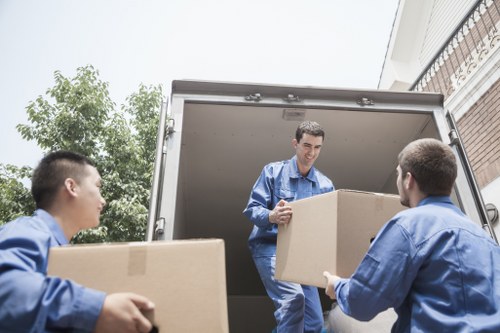Council Rubbish Collection Waltham Forest

Living in Waltham Forest comes with many conveniences, including an efficient council rubbish collection service. Proper rubbish collection is essential for maintaining a clean and healthy environment. Understanding how the Council Rubbish Collection Waltham Forest operates can help residents manage their waste more effectively.
The council provides regular collection schedules for different types of waste, including general household rubbish, recycling, and bulky items. It's crucial to follow these schedules to ensure that waste is collected promptly and does not accumulate in your neighborhood.
Residents are encouraged to sort their waste according to the council's guidelines. Proper sorting not only helps in effective waste management but also promotes recycling and reduces the amount of waste that ends up in landfills.
Waste Collection Schedule

The Waltham Forest rubbish collection service operates on a specific schedule that varies depending on the type of waste:
- General Waste: Collected weekly on designated days.
- Recycling: Collection is twice a week to ensure recyclables are processed efficiently.
- Bulky Items: Available for collection on request, usually once a month.
It's important to adhere to these schedules to avoid missed collections. The council provides an annual timetable that outlines specific collection dates, which can be found on the official website or through the council's mobile app.
Recycling Initiatives

Recycling is a significant component of the Council Rubbish Collection in Waltham Forest. The council encourages residents to recycle as much as possible to reduce the environmental impact.
What Can Be Recycled?
- Paper and Cardboard
- Glass Bottles and Jars
- Plastic Containers
- Metal Cans
- Electronic Waste
By properly sorting these materials, residents contribute to a more sustainable community. The council provides clear instructions on how to prepare items for recycling to ensure they are processed correctly.
Bulky Waste Collection

Sometimes, large items like furniture or appliances need to be disposed of. The Bulky Waste Collection service in Waltham Forest addresses this need.
To arrange a bulky waste collection, residents must contact the council in advance. It's advisable to book the service early, especially during peak seasons, to ensure a timely pickup.
Proper preparation of bulky items is essential. Items should be placed at the designated collection point and should not obstruct pathways or driveways. The council may have specific guidelines on how to arrange these items for efficient collection.
Hazardous Waste Disposal

Disposing of hazardous waste requires special handling to prevent environmental contamination and ensure public safety. The council offers designated facilities and special collection days for hazardous materials.
Examples of Hazardous Waste
- Batteries
- Paints and Solvents
- Medicines
- Electronic Components
- Chemical Cleaners
Residents should never dispose of hazardous waste in regular rubbish bins. Instead, use the council's designated drop-off points or participate in special collection events to ensure safe and responsible disposal.
Reducing Household Waste

Reducing the amount of waste generated at home is beneficial for both the environment and the council's collection services. Implementing simple practices can lead to significant reductions in household waste.
Tips for Reducing Waste:
- Use reusable bags instead of single-use plastic bags.
- Opt for products with minimal packaging.
- Compost organic waste like food scraps and garden waste.
- Repair items instead of discarding them.
- Donate or recycle items you no longer need.
By adopting these habits, residents can minimize their waste footprint and support the council's sustainability goals.
Special Collection Services

The council offers various special collection services to address specific waste management needs. These services cater to different types of waste and ensure that even specialized items are handled appropriately.
Types of Special Collections:
- Garden Waste Collection
- Construction and Demolition Waste
- Electronic Waste Recycling
- Textile Recycling
- Household Hazardous Waste Collection
Residents can schedule these collections through the council's website or by contacting the waste management department directly. It's essential to follow the specific guidelines for each type of collection to ensure efficient processing.
Penalties for Non-Compliance

While the council strives to provide comprehensive rubbish collection services, non-compliance with waste disposal regulations can result in penalties. Understanding these consequences can encourage residents to adhere to the guidelines.
Common penalties include fines for:
- Missed or overdue collections
- Improper waste sorting
- Illegal dumping of waste
- Non-compliance with special waste disposal requirements
To avoid these penalties, residents should stay informed about the council's waste management policies and ensure they follow the prescribed methods for waste disposal.
Community Engagement and Support

The success of the Council Rubbish Collection Waltham Forest relies on active community participation. The council organizes various programs and initiatives to engage residents in effective waste management practices.
Community Programs:
- Recycling Education Workshops
- Composting Demonstrations
- Waste Reduction Challenges
- Volunteer Clean-Up Events
- Public Awareness Campaigns
Participating in these programs not only helps improve waste management but also fosters a sense of community responsibility towards maintaining a clean and sustainable environment.
Technological Advancements in Waste Management

Advancements in technology have significantly improved waste management processes in Waltham Forest. The council leverages modern tools and systems to enhance the efficiency and effectiveness of rubbish collection services.
Innovations Include:
- Smart Bin Systems that notify the council when they are full
- Mobile Apps for scheduling and tracking collections
- Automated Sorting Facilities for recycling
- Data Analytics to optimize collection routes
- Electric and Low-Emission Collection Vehicles
These technologies not only streamline waste collection but also contribute to reducing the environmental impact of the council's operations.
Cost of Rubbish Collection Services

The council offers rubbish collection services as part of community services funded through local taxes. Understanding the cost structure can help residents appreciate the value provided and manage their budgets accordingly.
In addition to standard collection services, there may be fees for:
- Bulky Waste Collections
- Special Waste Disposal
- Additional Recycling Bins
- Penalty Fines for Non-Compliance
The council periodically reviews and updates the cost of services to ensure sustainability and the ability to meet community needs effectively.
Environmental Impact

The environmental impact of effective rubbish collection cannot be overstated. Proper waste management practices help reduce pollution, conserve resources, and promote sustainability in Waltham Forest.
Key Environmental Benefits:
- Reduction in Landfill Use
- Enhanced Recycling Rates
- Lower Carbon Emissions from Efficient Collection Routes
- Protection of Local Ecosystems
- Promotion of Circular Economy Principles
By participating in and supporting council waste management initiatives, residents contribute to a healthier and more sustainable environment for future generations.
Local Partner Collaborations

The council collaborates with various local partners to enhance rubbish collection and waste management services in Waltham Forest. These collaborations ensure that resources are used efficiently and that residents receive comprehensive support.
Key Collaborations Include:
- Partnerships with Recycling Plants
- Agreements with Waste Collection Contractors
- Collaboration with Environmental Organizations
- Joint Initiatives with Local Businesses
- Engagement with Community Groups
These partnerships enable the council to implement innovative solutions, access additional expertise, and expand the range of services available to residents.
Upcoming Changes and Improvements

The council is continuously seeking ways to improve rubbish collection services in Waltham Forest. Upcoming changes aim to enhance efficiency, increase recycling rates, and better serve the community's needs.
Planned Improvements:
- Introduction of Automated Recycling Stations
- Expansion of Bulk Waste Collection Services
- Investment in Advanced Waste Sorting Technologies
- Implementation of Resident Feedback Mechanisms
- Enhanced Educational Campaigns on Waste Reduction
Residents are encouraged to stay informed about these changes and participate in the council's initiatives to support ongoing improvements.
10-15 Closest Areas to Waltham Forest

Waltham Forest is surrounded by several areas, each with its own unique characteristics and proximity to council rubbish collection services. Understanding these nearby areas can help residents access additional resources and collaborate on waste management initiatives.
Nearby Areas:
- Stratford: Located just west of Waltham Forest, Stratford benefits from the area's extensive recycling facilities.
- Chingford: To the north, Chingford offers additional bulky waste collection services and community clean-up events.
- Hackney: East of Waltham Forest, Hackney collaborates on shared recycling programs and environmental initiatives.
- Enfield: Southwest of Waltham Forest, Enfield provides specialized hazardous waste disposal services.
- Tottenham: Adjacent to Waltham Forest, Tottenham participates in joint waste reduction campaigns and education workshops.
- Leyton: South of Waltham Forest, Leyton benefits from the council's advanced waste sorting technologies.
- Walthamstow: Directly within Waltham Forest, Walthamstow is a key area for community engagement and support initiatives.
- Liverpool Street: Nearby, Liverpool Street collaborates on smart waste management solutions and data analytics projects.
- Wood Green: To the northwest, Wood Green enhances proactive recycling efforts and technological advancements in waste collection.
- Ilford: Southeast of Waltham Forest, Ilford offers expanded recycling services and community support programs.
- Forest Gate: Sharing borders with Waltham Forest, Forest Gate engages in collaborative environmental protection initiatives.
- South Woodford: Nestled within Waltham Forest, South Woodford is pivotal for composting and organic waste management.
- Lewisham: While slightly further, Lewisham partners on regional recycling and waste reduction strategies.
Conclusion

The Council Rubbish Collection Waltham Forest plays a vital role in maintaining the area's cleanliness and sustainability. By understanding the various services offered, adhering to collection schedules, and participating in recycling initiatives, residents can contribute significantly to effective waste management.
Embracing responsible waste disposal practices not only benefits the environment but also enhances the quality of life for everyone in the community. Stay informed, stay engaged, and work together with the council to keep Waltham Forest a clean and sustainable place to live.
Frequently Asked Questions
1. How do I find my rubbish collection day in Waltham Forest?
You can find your specific rubbish collection day by visiting the Waltham Forest Council website and entering your postcode in the waste collection section. Alternatively, you can download the council's mobile app for easy access to your collection schedule.
2. What items are accepted in the recycling collection?
The recycling collection accepts paper, cardboard, glass bottles and jars, plastic containers, metal cans, and electronic waste. Make sure to rinse and sort items according to the council's guidelines to ensure they are processed correctly.
3. How can I arrange for bulky waste collection?
To arrange bulky waste collection, contact the Waltham Forest Council's waste management department through their website or phone service. It's recommended to book in advance, especially during busy periods.
4. Are there any costs associated with rubbish collection services?
Standard rubbish collection services are funded through local taxes. However, there may be fees for additional services such as bulky waste collection, special waste disposal, and excessive recycling bins. Check the council's website for detailed information on any applicable fees.
5. What should I do with hazardous waste?
Hazardous waste should not be disposed of in regular rubbish bins. Instead, use the council's designated hazardous waste drop-off points or participate in special collection events organized by the council to ensure safe and proper disposal.